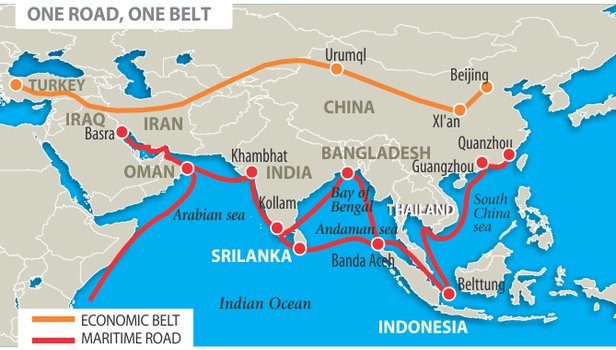Why Is India Upset from China's 'One Belt One Road'?
15 May 2017 ( IBTN News Bureau )
In the ancient days, China, and much of East Asia, was connected to the rest of the world through a route that got its name from China’s biggest export - silk. Today, the country is looking to rebuild a route that will connect Asia, Africa and Europe - a new Silk Road.
The One Belt One Road (OBOR) initiative will include roads, railways and ports and seems like a natural step for the world’s biggest trading country. After all, Asian Development Bank has said that the region, which is home to 60 percent of the world’s population, requires over $26 trillion in investment by 2030 to keep economies growing.
But the rest of the world - especially India - isn’t very happy about a project that it sees as not simply an economic initiative but as a means to push political influence and change status quo in some places. Kashmir, for example.
Chinese President Xi Jinping’s baby, the One Belt One Road was announced in 2013. Since then projects have been launched in various countries like Tajikistan, Thailand, Kenya and Vietnam financed by Chinese loans.
While some countries like Pakistan and Afghanistan are keen on OBOR, countries like India and Indonesia are wary because of the shift in status quo that this project could cause in sensitive areas like Kashmir and the South China Sea.
Chinese officials, however, reject the suggestion that the OBOR is a power play.
“The Chinese government has never wished to control any other country’s government,” a Cabinet official, Oi Xiaoli, told The AP. “We feel in contacts between countries, we need to talk about studying benefits, studying mutual profit.”
But Why’s India Worried?
As part of the OBOR, in Pakistan, there is a proposed $1.3 billion effort to expand the Karakoram Highway as part of the China-Pakistan Economic Corridor (CPEC). Now this involves power plants, roads and railways that will span the length of Pakistan and link China’s western region of Xinjiang to the Gwadar port, which was built with Chinese help.
But the CPEC runs through Pakistan-occupied Kashmir.
The establishment of a project with China in the disputed territory gives Pakistan’s occupation of the area a degree of legitimacy. And India’s clear stand on the issue is that Pakistan is illegally occupying Indian territory. Getting on board OBOR or talking to China and Pakistan about CPEC would be problematic for India as it could be seen as conceding ground to Pakistan. It would also involve a third country which goes against India’s stand that this is a bilateral issue which needs to be worked out between the two neighbours.
China held a conference centred around OBOR in Beijing and heads of states, governments and representatives from 29 countries and international organisations were present, including the US, Russia and the IMF. India stayed away from it but the global representation definitely legitimised the initiative.
Vladimir Putin, President, Russia Poverty, social chaos... the development level of countries and regions – all this creates a breeding ground for international terrorism, extremism as well as irregular migration. We shall not be able to live up to these challenges should we fail to overcome the stagnation of the global economic development.
Antonio Guterres, Secretary General, United Nations It is in our shared interest to show that the global economy can serve all the world’s people.
“Peace and development go hand in hand. ‘One Belt, One Road’ signifies that geo-economics must take precedence over geopolitics and that the centre of gravity should shift from conflict to cooperation. We see it as a path for overcoming terrorism and extremism,” said Nawaz Sharif, Prime Minister, Pakistan
Recep Tayyip Erdogan, President, Turkey This is going to be the kind of initiative that will put an end to terrorism.
Henry Paulson, Former Treasury Secretary, United States of America I know the United States has been among those countries apparently most skeptical of the ‘Belt and Road’. Simply put, the more China can demonstrate that the ‘Belt and Road’ initiative is open to outside participation in this way, the more it will be embraced by global and even American firms and suppliers.
(Click here for Android APP of IBTN. You can follow us on facebook and Twitter)
Share This News
About sharing
-
 16 Sep 2025
UN inquiry finds Israel’s war on Gaza to be genocide
16 Sep 2025
UN inquiry finds Israel’s war on Gaza to be genocide
UN inquiry finds Israel’s war on Gaza to be genocide
-
 16 May 2025
Has Donald Trump taken US-Gulf relations to a new era?
16 May 2025
Has Donald Trump taken US-Gulf relations to a new era?
Has Donald Trump taken US-Gulf relations to a new era?
May 16, 2...
-
 16 May 2025
What do the Gulf states gain from the US president's historic trip to the region?
16 May 2025
What do the Gulf states gain from the US president's historic trip to the region?
What do the Gulf states gain from the US president's historic trip to the regio...
-
 15 May 2025
Pakistan FM: US didn't force the ceasefire with India | Talk to Al Jazeera
15 May 2025
Pakistan FM: US didn't force the ceasefire with India | Talk to Al Jazeera
Pakistan FM: US didn't force the ceasefire with India | Talk to Al Jazeera
-
 15 May 2025
How will the lifting of US sanctions help Syrians rebuild their country?
15 May 2025
How will the lifting of US sanctions help Syrians rebuild their country?
How will the lifting of US sanctions help Syrians rebuild their country?



